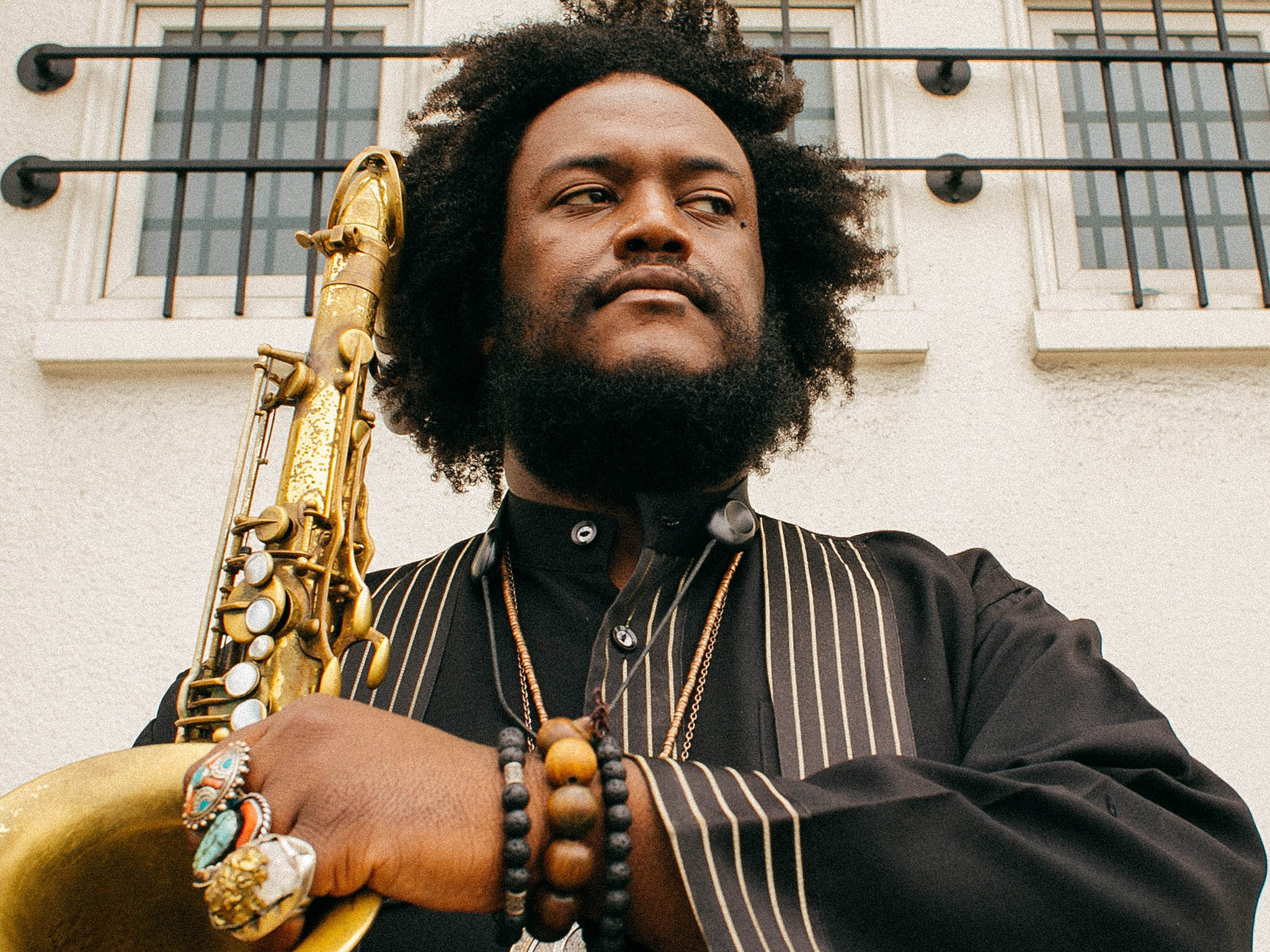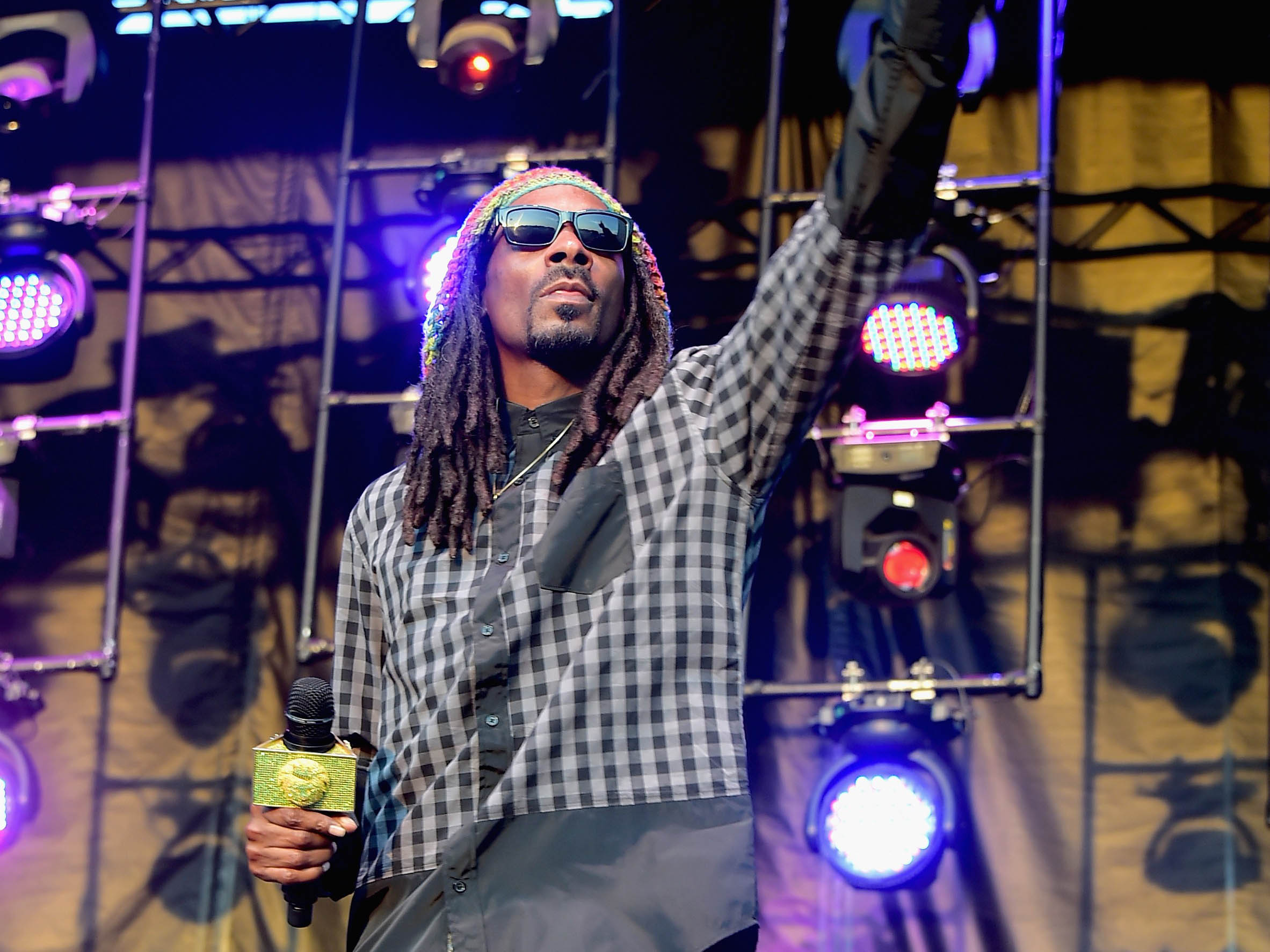Kamasi Washington: after touring with Snoop Dogg, could he be jazz's next superstar?
Could Kamasi Washington be jazz’s next superstar? He talks to Phil Johnson

It’s early days, but Kamasi Washington could be the biggest thing to hit jazz for years, decades even. The 34-year-old Californian saxophonist, composer, and bandleader has succeeded in making experimental improvised music that sounds both contemporary and relevant – and, crucially, attractive to younger listeners – without short-changing its essential jazziness. It helps that Washington’s back-story has popular appeal: he played and arranged on the rapper Kendrick Lamar’s recent million-selling album To Pimp A Butterfly; one of his first gigs, he says, was playing in Snoop Dogg’s band the Snoopadelics, and he’s toured with Raphael Saadiq and Lauryn Hill.
But while Washington and the other members of his coalition of musicians, The West Coast Get Down, turned to hip-hop and R&B to make their names and make a living, they’ve been playing jazz together since they were children in the schools and community projects of South Central LA. “It was all we did, all day, every day”, he says when I talked to him at a hotel in Rotterdam, on the eve of the band’s European tour, which will include a sold-out performance at the Barbican for the London Jazz Festival this week. “We learned more from each other than we learned from anyone else.”
In person Kamasi Washington is a large, slightly shambling figure in loose-fitting clothes, his grown-out hair and straggly goatee less priestly-looking than on his photograph for the cover of The Epic, his debut album as a leader, which he released in June. Washington thinks big, too: lasting 172 minutes over three CDs or six sides of vinyl, The Epic is a remarkable magnum opus. Linking the “spiritual jazz” pioneered by John and Alice Coltrane in the Civil Rights years, to the musical and social contexts of the USA today, it uses a massive cast, including a 32-piece orchestra and a 20-voice choir alongside his own 10-piece band the Next Step, to create an intensely-worked suite that continually surprises through whooshing Walt Disney strings, ethereal voices and samples of Malcolm X.
When you learn that it was recorded over a month’s worth of sessions that also produced material for eight other projects by various members of The West Coast Get Down, The Epic looks even more special. The album has already sold nearly 70,000 copies since its release, an astronomical number for a contemporary jazz record; in the current iTunes Jazz Top 10, dominated by Louis Armstrong, Miles Davis, Nina Simone and Frank Sinatra, Washington is one of the very few artists who’s not dead.
The Epic’s bridge between old and new is not accidental. It’s released on the Brainfeeder label owned by the producer Flying Lotus, who is Alice Coltrane’s great-nephew. The other members of the West Coast Get Down who appear on the album, like Stephen Bruner, known as Thundercat, and bassist Miles Mosley, come – like Washington himself, who’s the saxophonist son of a saxophonist father – from musical families with deep connections to LA’s relatively neglected jazz scene. “We were like ghetto kids in the Nineties who benefited from the Clinton administration’s funding for community projects,” says Mosley, who I meet at breakfast before my interview with Washington. “There was the money for us to study with really famous musicians like Ray Brown and Billy Higgins [whose World Stages jazz centre in Leimert Park became an informal conservatoire].”
“None of us really went to parties or hung out ... playing music was all we cared about,” adds Washington of their musical apprenticeship. “But when we graduated, all kinds of people wanted us on their gigs and we got pulled in different directions.
I went out on tour with Snoop Dogg, Thundercat went out with the rock band Suicidal Tendencies, and so on. What happened over the years was that we began to cherish the time when we could play with each other again.”

What was to become The Epic began – fittingly for a three-decker concept album where the mystical tradition of Seventies UK prog-rockers such as Yes is perhaps inescapable – with a recurring dream of a story about The Guard, a Ninja-like defender of a misty mountain fortress who has to protect his territory against those who would try to replace him. The story, which is to become a graphic novel, inspired the astonishingly vivid opening song, “Change of the Guard”, whose themes are reprised throughout the album. “It was The Epic because of the story,” he says. “I was thinking this is Homeric. I didn’t want it to just be a collection of random songs, I wanted it to have a purpose, and that you’d want to listen to it all the way through, because one thing led to another. I never really thought about the size of it.”
Many of the ideas go back to his time with the Snoopadelics. “I’d be out on the road with Snoop and it’s like crazy, there’d be groupies, dope, partying, bottles of Hennessy … We’d party a little bit but nine times out of 10 we’d be looking for a jam session. Snoop thought it was hilarious that we’d do his gig and then go out to find somewhere to play every night. We’d play like a stadium and then go and find this little jazz club with five people in it. We looked like we played with Snoop, too, so at the jam sessions people would be in disbelief that we could play jazz.” And this, he says, is what the album is about: The Guard is protecting the spirit of the music, protecting jazz, and he and his friends wanted to change the guard and become the next protectors, the keepers of the flame. “But what we intended to happen, didn’t happen. At that time we were all so jazz, absolutely jazz, but we were on gigs that were not jazz gigs. But it’s like you’re on your journey and then you get lost, you’re looking for Excalibur but there’s a beautiful princess being chased by a dragon, so you have to leave Excalibur and fight the dragon! But by doing that you’re learning the skills to take you to the next level.”
Enjoy unlimited access to 100 million ad-free songs and podcasts with Amazon Music
Sign up now for a 30-day free trial. Terms apply.
ADVERTISEMENT. If you sign up to this service we will earn commission. This revenue helps to fund journalism across The Independent.
Enjoy unlimited access to 100 million ad-free songs and podcasts with Amazon Music
Sign up now for a 30-day free trial. Terms apply.
ADVERTISEMENT. If you sign up to this service we will earn commission. This revenue helps to fund journalism across The Independent.
Now the guard has changed, Washington is getting the respect of his elders, with sax stars such as Pharoah Sanders and Kenny Garrett letting him know they like what he’s doing. His father, Rickey, who has recently retired from his job as a music teacher, is on the tour with him, guesting with the band. “I’m so happy to be doing this with my friends,” Washington says. “And then I want to see their music come up, so it doesn’t just end with my album. I want to do the Miles Mosley tour, the Ronald Bruner tour. We’ve already had our fights and everyone wants something different. My dreams and aspirations are mine and I think they have similar aspirations, but we will see.”
Kamasi Washington and the Next Step play Colston Hall, Bristol on 13 Nov, and The Barbican on 14 Nov. The latter performance will be broadcast exclusively live on ‘BBC Music Jazz’ a temporary pop-up radio station for the London Jazz Festival, available on DAB, www.bbc.co.uk/musicjazz and mobile.
Join our commenting forum
Join thought-provoking conversations, follow other Independent readers and see their replies
Comments